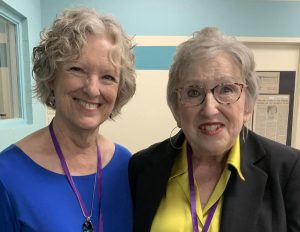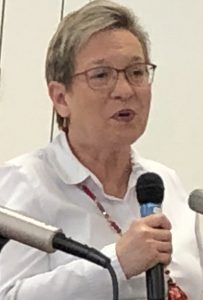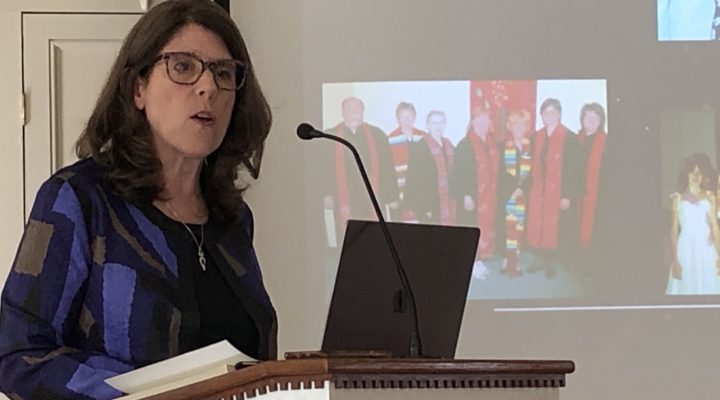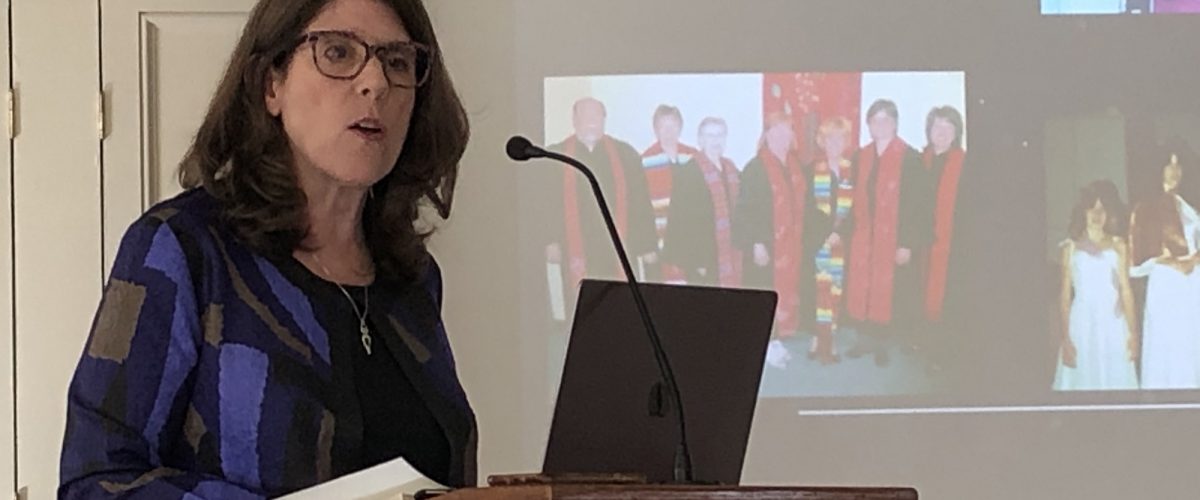A gender struggle was central to the Southern Baptist Convention schism, but interpreters of the controversy largely have failed to deal with this reality, a Baptist professor said during a lecture in Louisville, Ky.
“They treated women as an issue rather than as people who’ve had an experience and whose experience told us about the gendered structure of the SBC itself,” said Eileen Campbell-Reed, visiting associate professor of pastoral theology and care at Union Theological Seminary in New York City. She addressed “Baptist Clergywomen: 50 Years of Growth and Change” during the 2023 William M. Johnson Lecture held Saturday, Sept. 30, at Crescent Hill Baptist Church.
In her 2016 book, Anatomy of a Schism: How Clergywomen’s Narratives Reinterpret the Fracturing of the Southern Baptist Convention, Campbell-Reed explored the lives of “everyday clergywomen” who came of age vocationally against the backdrop of the SBC controversy.
During her lecture, Campbell-Reed shared the stories of some of those clergywomen and the events that shaped their lives. Rebecca, one of the women in the book, was baptized as a 6-year-old into a Baptist church in 1973, which Rebecca says “taught her both about God’s love and her inferiority as a female.”
“Rebecca and her family soon left that congregation when her parents felt the critical judgment of pronouncements against their divorce,” Campbell-Reed said. “For Baptist women, the social landscape of the early 1970s was less than hospitable.”
“For Baptist women, the social landscape of the early 1970s was less than hospitable.”
However, another woman in Campbell-Reed’s study, Martha, was nurtured in environs more friendly toward women’s leadership. Her congregation started ordaining women as deacons in the 1970s. During that decade, some SBC leaders started taking notice of the emergence of women in leadership roles.
In 1974, the SBC Christian Life Commission convened a seminar on the theme “Christian Liberation and Women in the Church.” Four years later, the first and only consultation on Southern Baptist women in church-related vocations was held in Nashville. The group included SBC agency heads, seminary students, pastors, lay people, journalists and historians.
“No one was elected, and no committees were appointed, but the 300 or so in attendance heard reports, survey results, historical accounts and psychological analysis about women in the Southern Baptist churches and agencies,” Campbell-Reed said.
“Those gathered also heard impassioned pleas and insistent questions for women who felt called by God to be ministers. Some of those women were already ordained and serving. Others were still trying to discern the meaning of their call. Southern Baptists seemed poised to hear these concerns and lend support or at least not hinder.”

Nancy Hastings Sehested and Susan Lockwood
However, also in that decade, conservative Southern Baptists were stepping up organizational efforts to gain control of the SBC. They scored their first major victory in 1979 with the election of Adrian Rogers as SBC president. By 1990, the conservative faction controlled the boards of all SBC agencies and institutions.
Campell-Reed said conservatives began sounding the alarm about a leftward drift in the SBC beginning in the 1960s when the Southern Baptist Sunday School Board published The Message of Genesis, which challenged a strictly literal reading of the first book in the Bible. Their distress was fueled by the shifting cultural values of the decade, she noted.
Interestingly, when Addie Davis in 1964 became the first Southern Baptist woman ordained to ministry, the kerfuffle that followed was rather brief. Campbell-Reed speculated that Davis’ call to an American Baptist congregation in Vermont curtailed the controversy.
Only nine women were known to have been ordained to the ministry in Southern Baptist churches in the 10 years that followed Davis’s ordination.
Only nine women were known to have been ordained to the ministry in Southern Baptist churches in the 10 years that followed Davis’s ordination, Campbell-Reed said. But by the end of the 1970s, scholars Leon McBeth and Helen Lee Turner identified 58 women who were ordained by Southern Baptist congregations.
One indicator of the growth of women serving in Southern Baptist ministerial roles was the formation of Southern Baptist Women in Ministry, which later became known as Baptist Women in Ministry, in Louisville at Crescent Hill Baptist Church in 1983.

Susan Howell
After her address, Campbell-Reed joined a panel discussion that included Susan Lockwood, who was called in 1983 as pastor of Cornell Heights Baptist Church, a Southern Baptist congregation in Chicago. Lockwood, who is now retired, said she was among 14 women serving as senior pastors of Southern Baptist congregations when she began her pastorate.
In response to a question by panel moderator Reba Cobb, a founder of BWIM, about her experience as a Baptist clergywoman, Lockwood said, “It’s been difficult, demanding, challenging, heartbreaking, crushing, frustrating, infuriating and compelling, rewarding and inspiring, but mostly, it’s been an ongoing, unremitting battle, kind of a big, fat struggle.”
Another panelist, Susan Howell, a psychology professor at Campbellsville University, said she is grieved when she hears derogatory statements about women who strive for equality and excellence in their vocations.
“It makes me sad, because I realize that gives us an extra hurdle men don’t have to jump,” said Howell, author of a 2022 book titled Buried Talents: Overcoming Gendered Socialization to Answer God’s Call.
“And then whenever we stumble, because we do have an extra hurdle, then that’s just like proof that they’re correct, and so there’s just a lot of sadness, even though I certainly do go ahead and try to prove them wrong. I shouldn’t have to.”
While female pastors still are not common among Baptists in the South, the number of Baptist women serving as pastors and co-pastors in Baptist congregations has grown significantly when compared to the 14 in pastoral leadership 40 years ago.
According to a 2021 study by BWIM, the Cooperative Baptist Fellowship, which encompasses the largest constellation of churches that left the SBC in the schism, has 105 women serving as pastors or co-pastors. Of the 1,422 CBF congregations, 7.4% have women who serve in pastoral leadership.
Meanwhile, 45.1% of Alliance of Baptist congregations, a smaller and more progressive group that formed amid the controversy, are served by women as either pastors or co-pastors. Among the 133 Alliance churches, women provide pastoral leadership in 60.


